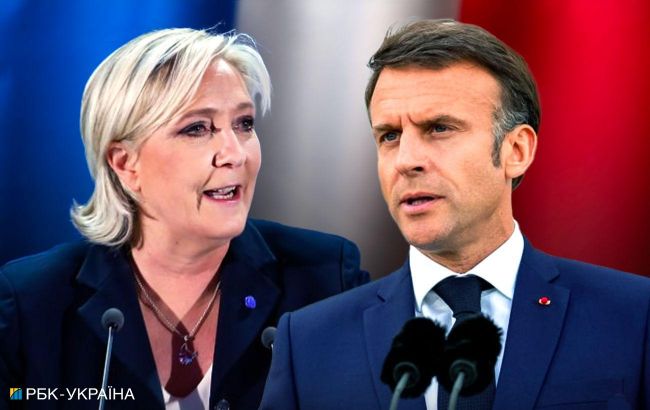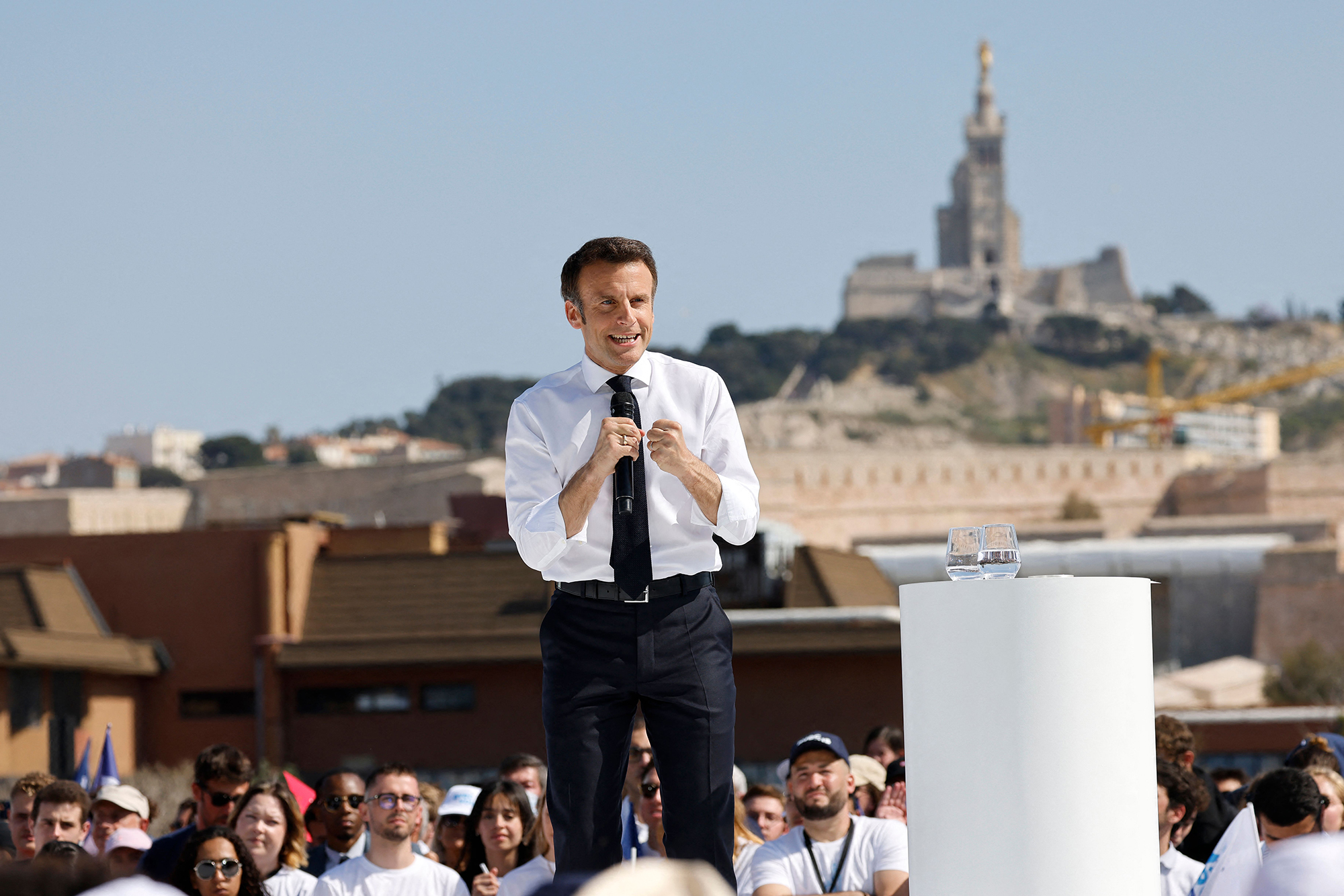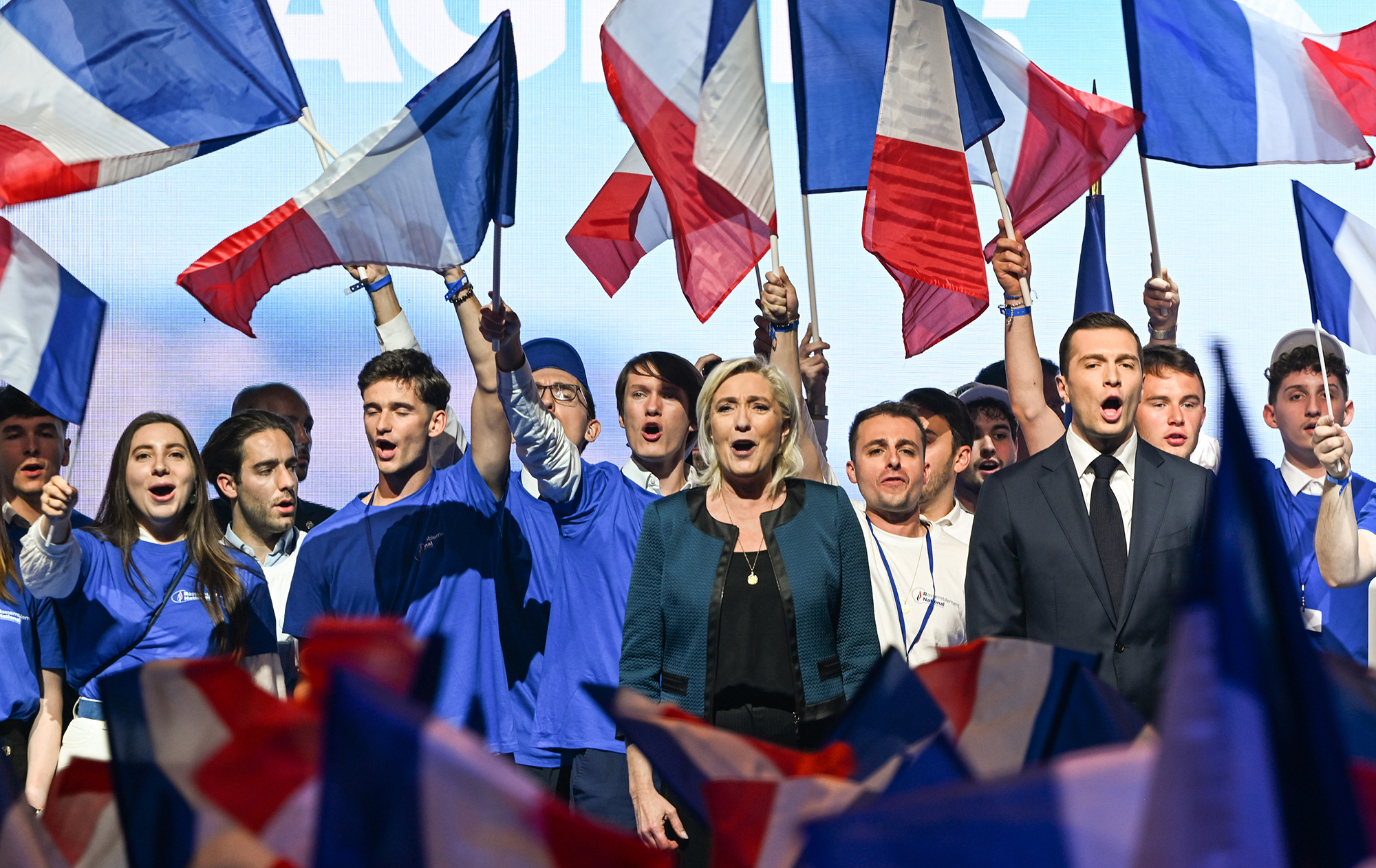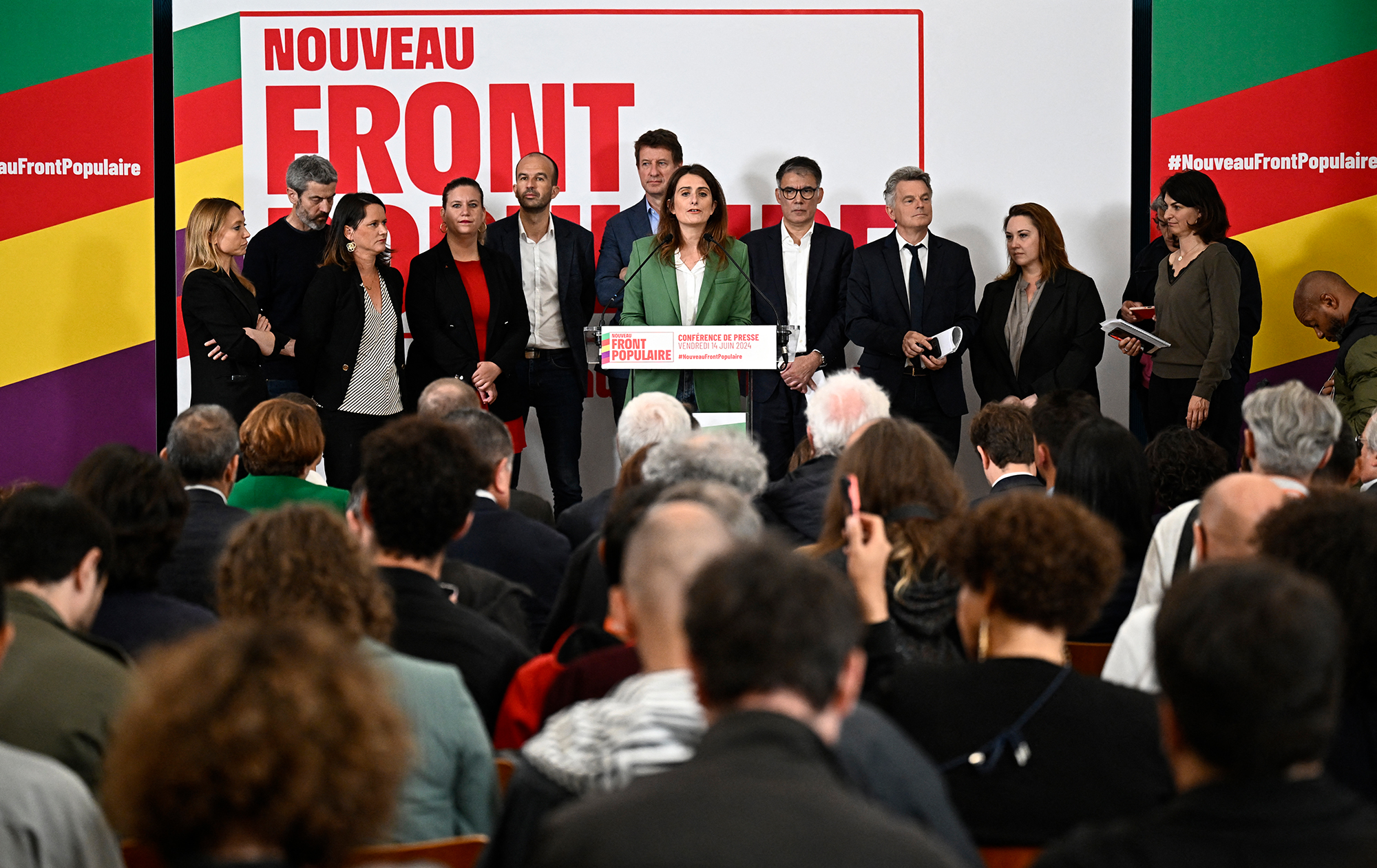Macron against all: What France's parliamentary elections mean for Ukraine
 Marine Le Pen and Emmanuel Macron (collage: RBC-Ukraine)
Marine Le Pen and Emmanuel Macron (collage: RBC-Ukraine)
Tomorrow, June 30, France will hold the first round of extraordinary elections to the lower house of parliament. The country's President, Emmanuel Macron, called for these elections in response to the rise of right-wing populists from the National Rally during the European Parliament elections. Explore the campaign dynamics and how the elections could reshape France in the article by RBC-Ukraine journalist Roman Kot.
Content
What is the main intrigue of the elections
How efforts to restrain the far-right worked before and why they are less effective now
How Macron's failures help the opposition
Jordan Bardella and his course
What could change in France after the elections
What is the main intrigue of the elections
The main intrigue of the elections is whether the rise to power of the far-right party National Rally (Rassemblement national, abbreviated RN) can be halted. It has long sought power but without success thus far. This time, the chances are greater than ever.
This far-right party was founded back in 1972 under the name National Front by Jean-Marie Le Pen. He ran several times for president, even making it to the second round in 2002, but consistently lost. Later, his daughter Marine Le Pen took over the party leadership, rebranding it to moderate its radical image. In 2018, the National Front transformed into the National Rally.
Polls indicate that the outcome of the snap elections in France remains highly uncertain. In the first round, RN is expected to secure a significant lead with approximately 35% of the votes, the left-wing coalition New Popular Front gathering around 28-29%, Macron's Renaissance party with 20-22%, and the Republicans with 7%.
However, there is a way to stop RN in the second round, as has happened multiple times in French history.
Parliamentary elections are conducted under a majoritarian system. The entire country is divided into 577 constituencies, with candidates competing for a single parliamentary seat in each. Once an RN candidate advances to the second round, all others unite against them. Despite consistently polling above 10% over the past 20 years, RN has managed to secure only a few deputies in parliament.
However, this strategy has recently encountered setbacks.
How efforts to restrain the far-right worked before and why they are less effective now
The issue first surfaced during the 2022 parliamentary elections when RN managed to secure 89 mandates.
Previously, French political life was dominated by two major forces - moderately left Socialists and moderately right Republicans. However, with Emmanuel Macron's rise to power, both were erased from France's political landscape, says Anastasia Shapochkina, Director of the Analytical Center Eastern Circles at Sciences Po Institute in Paris.
"Their place was taken by Macron's "center," which initially seemed non-systemic but over seven years built up an anti-rating due to Macron's reforms, among which pension reform was the most resonant. Today, when people who might have voted for Republicans or Socialists look left and right, they see Le Pen on the right and Melenchon on the left, and this has started working against Macron," explains Anastasia Shapochkina.
 Emmanuel Macron (photo: Getty Images)
Emmanuel Macron (photo: Getty Images)
According to her, the tradition of coalition political parties, as in Germany, is not characteristic of France. Instead, there is a practice of withdrawing candidates from one party in favor of candidates from another to strengthen opposition to a third party. This is what is currently observed at the local level between Macron's party and the New Popular Front.
At the moment, the New Popular Front is an "electoral alliance" where socialists have joined forces with the Greens, Communists, and Jean-Luc Mélenchon's far-left party Unbowed France. Over time, this could evolve into a political coalition, but for now, it remains a situational alliance.
"The left, now dominated by Mélenchon's party, like the National Front of the far right, historically had support from Moscow. In this regard, they are part of Russia's risk diversification strategy in France," says Anastasia Shapochkina.
On the other hand, remnants of the Republicans in the new parliament may cooperate with RN rather than Macron's party.
This is how the situation looks at the national level. It gets more complex in specific districts where purely local interests often intertwine, with their strong and weak candidates, and the influence of "old" parties may persist simply due to tradition.
"The two-round system can indeed limit the National Rally and hinder them from forming a majority in parliament. In the second round, an informal general alliance against the right-wing forces is likely to be formed to reduce their chances of forming an absolute majority. Currently, polls indicate that realistically, RN could secure around 260 seats out of the 289 needed to form a majority," comments European policy expert Alice Ruban for RBC-Ukraine.
In this situation, there are many variables and unknowns. Hence, a fierce battle is underway for the majority of constituencies.
How Macron's failures help the opposition
Opponents of French President Emmanuel Macron from both the right and left are capitalizing on widespread dissatisfaction with Macron's policies and appealing to his missteps. They point to reforms that have negatively impacted the lives of French citizens but may only show effects in a few years. This includes the controversial pension reform, issues with passing migration laws, stagnant purchasing power, rising electricity bills, and more.
"Macron's nickname "Jupiter" wasn't given to him for nothing. This change in image plays a significant role today: from a charismatic and alternative president to one who embodies the establishment. This perception suggests Macron is out of touch with society," says Anastasia Shapochkina.
Thus, to a large extent, voters are voting against Macron rather than for the opposition.
Jordan Bardella and his course
The shortcomings of Macron's governance are most exploited by the far-right RN. At the same time, this party has made significant efforts to shed its almost fascist past. A noticeable shift in rhetoric began at the end of 2022 when 27-year-old Jordan Bardella became the new leader of the party, although Marine Le Pen retains informal influence.
Jordan Bardella was born in 1995 in the Paris suburb of Drancy. He studied geography at the University of Paris IV - Sorbonne but left his studies in his third year to dedicate himself to politics.
Bardella led the RN list in the 2019 European Parliament elections, where his party secured first place.
Interestingly, he became the first person outside the Le Pen family to lead the RN. However, by 2020, he had dated Nolwenn Olivier, the granddaughter of Jean-Marie Le Pen and niece of Marine Le Pen. The couple divorced just days before the European elections.
"The main support for RN has a protest anti-system character, but thanks to the efforts of the new young party leader Jordan Bardella aimed at changing the party's image for normalization or mainstreaming, they managed to expand their traditional electorate and attract a new type of voter," notes Alice Ruban.

In the center, Marine Le Pen, on the right, Jordan Bardella (photo: Getty Images)
According to polls, around 30% of voters aged 18-24 support Bardella, who has a TikTok audience of 1.5 million and is a social media star, even among schoolchildren who informally call him "boss." The party has also gained support among parts of the middle and upper-middle class.
For this, Bardella makes intentionally vague, sometimes contradictory statements.
For example, the entire election campaign this year revolved around three main themes: solving migration issues, worsening purchasing power, and the possible deployment of French troops to Ukraine.
"RN's rhetoric in the spirit of "France first," but lacking in details: one of RN's stated goals is to increase purchasing power, but they don't explain how. Meanwhile, their anti-immigrant discourse overlooks that most so-called immigrants today are second or third-generation French," explains Anastasia Shapochkina.
Similarly, Bardella's statements regarding Ukraine have become less aggressive but still unclear.
For instance, during debates on June 27, he stated, "The National Rally will not allow Russian imperialism to engulf Ukraine."
"My position on this conflict is very clear. It has never changed. It is to support Ukraine and avoid escalation with Russia, which, I remind you, is a nuclear state," said Bardella.
At the same time, he regularly emphasizes that if he comes to power, he will refuse to send French troops to Ukraine.
Bardella has also distanced himself in the European Parliament from the far-right party AfD (Alternative for Germany), stating that he will no longer cooperate with them.
However, there are well-founded suspicions that RN maintains ties with Russia. During the aforementioned debates, French Prime Minister Gabriel Attal mentioned the scandal involving Tamara Volokhova, a Russian who acquired French citizenship and previously ran as a candidate on RN's list in municipal and legislative elections.
Volokhova also worked as a political advisor for the right-wing Identity and Democracy group in the European Parliament (which includes RN, Geert Wilders' Dutch Freedom Party, and Matteo Salvini's Italian League). She represented the group during closed meetings on security and defense issues, having access to confidential information, including regarding Ukraine. Several media investigations have shown her involvement in organizing connections between French deputies and Russia.
What could change in France after the elections
There are three basic scenarios for France after the elections. The first scenario is if RN manages to gain a majority in parliament. In such a case, Emmanuel Macron would be compelled to appoint Jordan Bardella, the leader of the party, as prime minister. This would lead to a "cohabitation" between the current president and an opposition prime minister, where each would seek to undermine the other.
The second scenario is a coalition dubbed the "swan, crab, and pike", comprising all parties except RN. According to Politico, discussions are ongoing within French political circles about forming such a broad coalition.
"Although they (other parties) have the potential to unite and form a coalition government without RN, the likelihood of such a formation remains low. For instance, the Socialist Party may ally with Macron's party to form a 'government of national unity', but due to numerous existing conflicts and mistrust between them, this is unlikely," says Alisa Ruban.
 Alliance New Popular Front (photo: Getty images)
Alliance New Popular Front (photo: Getty images)
Therefore, another option is the appointment of a technocratic cabinet, which would be equally distant from all parties, similar to the government of Mario Monti formed in Italy in 2011. However, even in such a scenario, RN or the left bloc would still wield significant influence over the government's operations.
All three scenarios threaten to paralyze state governance in France, including its foreign policy.
What to expect for Ukraine
At European Union summits, each state currently holds only one seat. This seat will, in any case, be occupied by Emmanuel Macron until the next presidential elections in 2027. Overall, the French president defines foreign policy. However, under current conditions, other positions are crucial for Ukraine, such as defense or economy ministers. Much of the aid to Ukraine will depend on them, and their work can be influenced by parliament.
Whether RN has definitively abandoned its pro-Russian rhetoric or if this is merely a pre-election maneuver remains an open question. There are already examples in the European Union where far-right parties have taken a pro-Ukrainian and anti-Russian stance to appease their voters, as was the case with Georgia Meloni's Brothers of Italy party.
In the case of France, however, things are not so clear-cut. Sometimes even old alliances can be forgotten in favor of current political interests.
Sources: sociological survey data, public statements from French politicians, and insights from European politics expert Alisa Ruban and Anastasiia Shapochkina, Director of the Analytical Center Eastern Circles.

